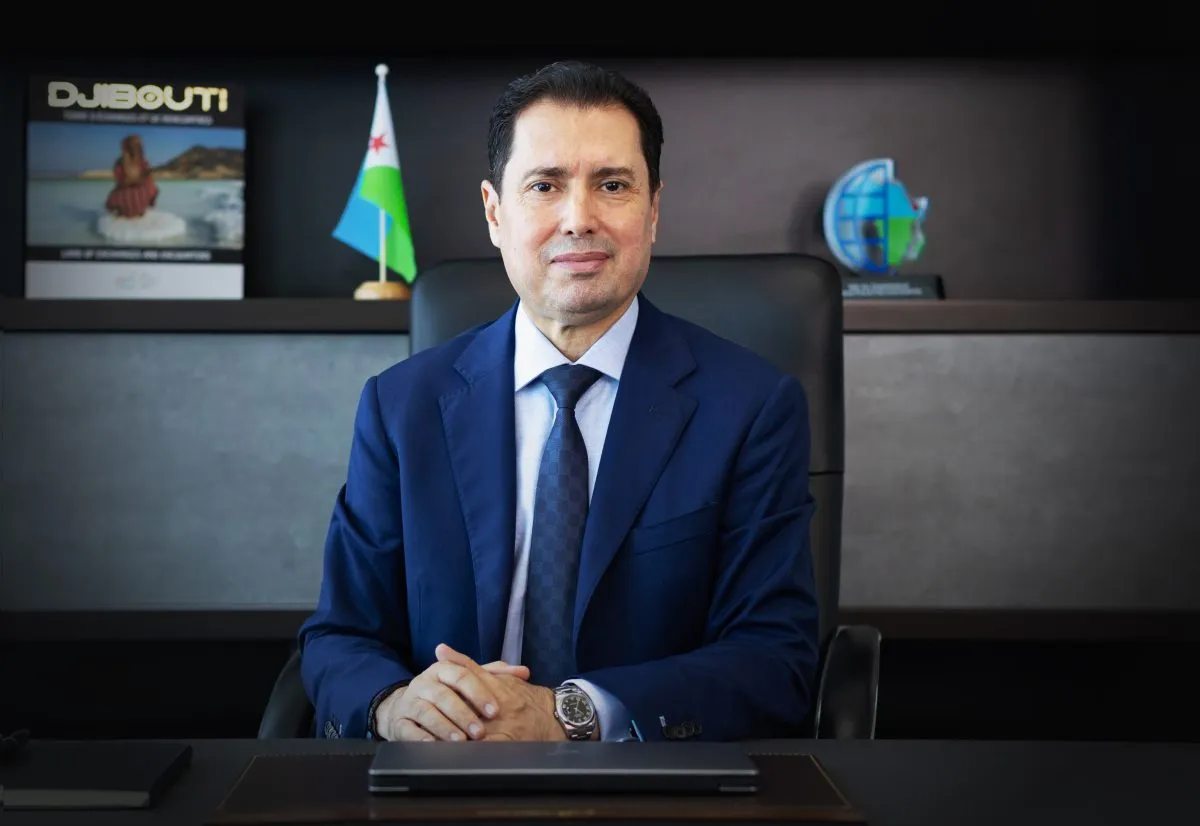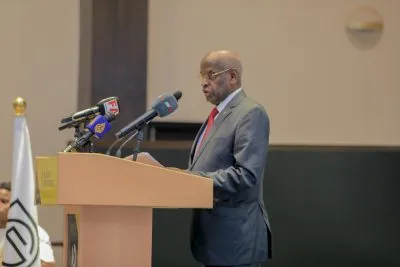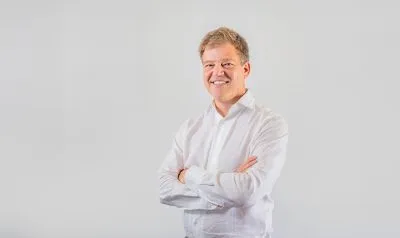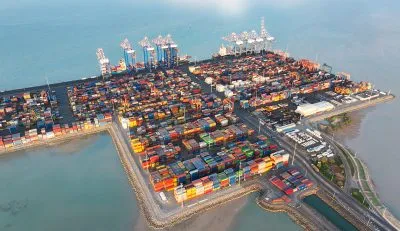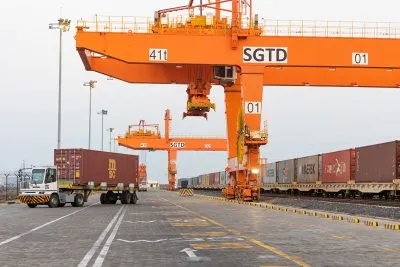Dr Slim Feriani, the CEO of the Fonds Souverain de Djibouti (FSD) or Sovereign Wealth Fund of Djibouti, is a British-Tunisian dual national. He has over 25 years of experience in international capital markets and recently served as a Minister in Tunisia where he led two portfolios, those of industry and SMEs as well as energy, mining and renewable energy.
His exposure to markets dates back to 1989, when as a professor at the George Washington University, he started to put the theories he was teaching into practice.
He is bullish about the economic prospects of one of Africa’s smallest but most dynamic countries. Djibouti, occupying a strategic spot at the Horn of Africa controlling entry into the Gulf of Aden and the Red Sea and linking the African mainland to the Middle East, has an outsize significance not only in the African context but globally. It is bordered by Somalia to the south, Ethiopia to the southwest and Eritrea in the north.
His optimism is informed by his first-hand experience, having managed the country’s sovereign fund over the past two years and seen the country’s steady transformation under its Vision 2035 development plan. He is also convinced that the country possesses all the factors needed for inclusive, sustainable success.
Recent investments in ports and logistics, hospitality, renewable energy and fintech are bearing fruit and attracting the attention of investors from both hemispheres. Vision 2035 has laid out an ambitious but feasible roadmap that both local and international stakeholders can conveniently plug into.
“Everything is relative and I think we need to put things into, first of all, the African context.” In this case, context places these achievements into even sharper relief.
Having been involved in investment activities in over 100 countries, Feriani should know a thing or two about the economic potential of states and he says that Djibouti is a solid bet.
The country currently does not have a sovereign rating from any international agency but he is confident that if this were the case, it would get a favourable rating.
“There are not a lot of countries that have macroeconomic fundamentals as good as we do – whether it’s inflation, current account balance, currency stability, foreign exchange reserves or the government leverage, which isn’t particularly high and is investment, not consumption-driven. So within Africa, I would say it’s a top-quartile country.”
It also helps that Djibouti is one of the most stable countries in its East African neighbourhood. President Ismaïl Omar Guelleh has presided over the country’s multi-party democracy, securing a fifth term in 2021.
Even more important, Feriani argues, is the presence of political will. “I think political stability is a key comparative advantage but I’ll add political will to that. People don’t pay much attention to political will but I think it’s even more important.”
Political will drives the kind of decision making that can lead to long-term benefits for a country in Djibouti’s position.
One of those early decisions was to peg the Djiboutian franc to the US dollar, which has been the case since 1949. The result is a very stable currency even in currently turbulent times, when larger economies such as Nigeria, Ethiopia and Egypt have had to surrender much of their currency’s value.
“If you want to make 10-15% annual investment returns in dollar or euro terms in another country where there is forex risk, you have to at least double that in local currency but here, you don’t have to worry; that is the advantage of the stability we have.” This, Feriani argues, means long-term institutional investors can expect US dollar returns of 10% or more annually. “Hence, you can double your money every seven years or less,” he argues.
Feriani believes that Djibouti is on a similar track to Singapore and Dubai, two countries that have overcome their lack of size, much smaller than Djibouti, and in the case of Singapore, its dearth of natural resources, to post phenomenal growth and transform the lives of citizens. “I see Djibouti today as where Singapore and Dubai were in the 70s and 80s. I see many similarities – and that history is important because we don’t have to reinvent the wheel.”
Closer home, he points to Morocco and Rwanda (landlocked and with a similar landmass to Djibouti’s) as countries which also stand out in Africa. The unifying thread, for Feriani, is leadership. “It’s all about leadership, management and vision. For companies, it’s the CEO and for countries, it’s the political leader. They make all the difference and that’s what we have here.”
In for the long haul
The establishment of the sovereign wealth fund by the government in March 2020 can be argued as emblematic of a leadership committed to building a dynamic and diversified economy.
“It was created by and for Vision 2035, which imagines a future for Djibouti beyond the ports,” Feriani explains. He is referring to the fact that following significant investments, Djibouti’s ports have made it something of a trading and shipping hub, capitalising on its strategic location.
But like the Singapores and Dubais that Feriani so admires, there has to be more to the country than dependence on a single resource.
To achieve this, he points out that sovereign funds are increasingly a go-to feature for ambitious developing economies that use them to catalyse and crowd investments into targeted areas of the economy, build infrastructure and provide a stabilising bulwark in times of crisis.
However, he cautions, “We don’t have a magic wand. It takes time and patience. This is a long-term objective. You don’t build a sovereign wealth fund – or a country – in two or three years. There are stages.”
This suggests that target sectors have to be picked carefully to ensure the optimal cost-benefit.
“We need to focus; we don’t have to overstretch ourselves.”
One of these sectors is tourism. “We have these amazing islands and lakes and we have to monetise them. We need to make sure that investments create jobs because ultimately our goal is to reduce unemployment and poverty – and tourism is the biggest employer in the world.”
He is also very enthusiastic about creating an international digital hub. A winner of the geographical lottery, Djibouti is in the almost perfect position to receive digital traffic. With its complement of 10 subsea cables, it compares favourably with other digital hotspots around the world, providing an important foundation on which to build a digital marketplace.
Financial services is another area of interest for the Fund. With a healthy and liquid banking sector, and stable currency, Feriani believes Djibouti offers a compelling proposition for investors in the financial services sector looking for a beachhead into the region.
The market is yet to mature in some critical ways but, he insists, this only represents more opportunity. “We need deeper financial markets but that is part of the opportunity. I prefer to look at the glass as half-full. So it’s an opportunity and that’s brilliant. Let’s work together to develop them,” he says, throwing down the gauntlet to the global investor community and part of their duty, encouraging them to make an impact on Djibouti and Africa more broadly.
Another sector is renewable energy. The Fund is involved in the Grand Bara solar project in partnership with Emirati company Amea Power, as well as with Neo Themis in two other solar projects, located in PK23 – at 47km2 the largest free zone in Africa – and Damerjog, in another new free zone that spans 30km2.
“The first one is for light industry and the second is for heavy industry, especially for the refining and storage of oil and gas,” he explains. Generating more energy will also support the country’s industrialisation, enabling traditional industries such as textiles and agribusiness to operate more cost-efficiently.
Feriani is quick to clarify that opportunities in health and education are not completely off their radar. “We are looking into that,” he says, “we must be patient, realistic and pragmatic. We must understand that there are stages.”
Private sector involvement is key
A key aim for the Fund is to boost private sector participation in the economy which, as Feriani points out, is dominated by the public sector. “Today, roughly three quarters of Djibouti’s economy is still run by the public sector and we need to switch that. Most economies are now driven largely by the private sector and SMEs so that is the role we want to play”.
Despite its ambitions, Feriani acknowledges that the Fund’s capacity has its limits. “We have decent but not unlimited financial resources.” That means approaching investments in a way that will deliver maximum returns without overstretching it. “We are happy to be a minority shareholder with a 25% share,” he says.
This approach seems to be drawing the right response from the markets. With the Fund sharing the risk, investors are encouraged to undertake these projects with mutual benefits across the board. The Fund boosts investments; investors get their returns and the country gets the projects and the attendant benefits, including job creation.
This is not only for international investors but also local private sector investors that Feriani says the Fund is developing relationships with. “Ideally, the kind of project we want to be in is where we are the ‘P’ in public-private partnerships and there’s a ‘P’ for private sector that is local and a ‘P’ for private sector that is international. That is Nirvana,” he declares.
Djibouti itself remains the key focus of the Fund in the short-term. While most sovereign funds deploy all or the majority of their funds on external international projects, the FSD aims to retain half of its investments within the borders of the home country.
“In our case, at this stage the focus has to be Djibouti first, but, obviously we can’t put all our eggs in one basket so by law, we have to have a balanced portfolio with roughly 50% invested in Djibouti and 50% outside.” Expectations from this young fund and its management are so high, that they first have to deliver more projects locally before diversifying their risk internationally.
In a rapidly growing developing country, there are opportunities everywhere and Djibouti typifies this. As someone who cut his teeth in emerging and frontier markets, Feriani finds this to be an exciting, rather than a daunting prospect. “There is a big opportunity to close the gap between perception and reality and as a global investor, I love that. I love to go into places where the perception is a lot worse than the reality and if you know what you’re doing, you can make a great trade.” In other words, investors who recognise the diamond in the rough now can gain the first mover advantage.
Feriani points out that the Fund is not an investment promotion agency but is actively engaged in attracting foreign direct investment into the country, which is vital to its social and economic development, as is the case for the rest of the world. With the investment engine firing and contributing to an annual real GDP growth back to its historical trend of around 7%, combined with a typically low annual inflation rate of 2-3%, Djibouti’s economy is likely to double in size within 7 years.
The Djibouti Investment Forum, set for 12th to 14th May, will give it a tremendous opportunity to make its pitch to a vast array of international money managers and Feriani is confident of the prospects.
“It’s a big project for us in terms of inviting 150 people from across the world. In barely two years, we have been able to attract about a dozen partners as a sovereign fund. So on average, we have succeeded in attracting about one partner every two months.”
The forum will give a new batch of investors the chance to discover Djibouti’s many opportunities. “Djibouti is a hidden gem and we need it to shine. It’s like a diamond in the rough; we need it to be discovered and to be polished so it can shine. The sky is the limit in Djibouti,” Feriani concludes.
Want to continue reading? Subscribe today.
You've read all your free articles for this month! Subscribe now to enjoy full access to our content.
Digital Monthly
£8.00 / month
Receive full unlimited access to our articles, opinions, podcasts and more.
Digital Yearly
£70.00 / year
Our best value offer - save £26 and gain access to all of our digital content for an entire year!
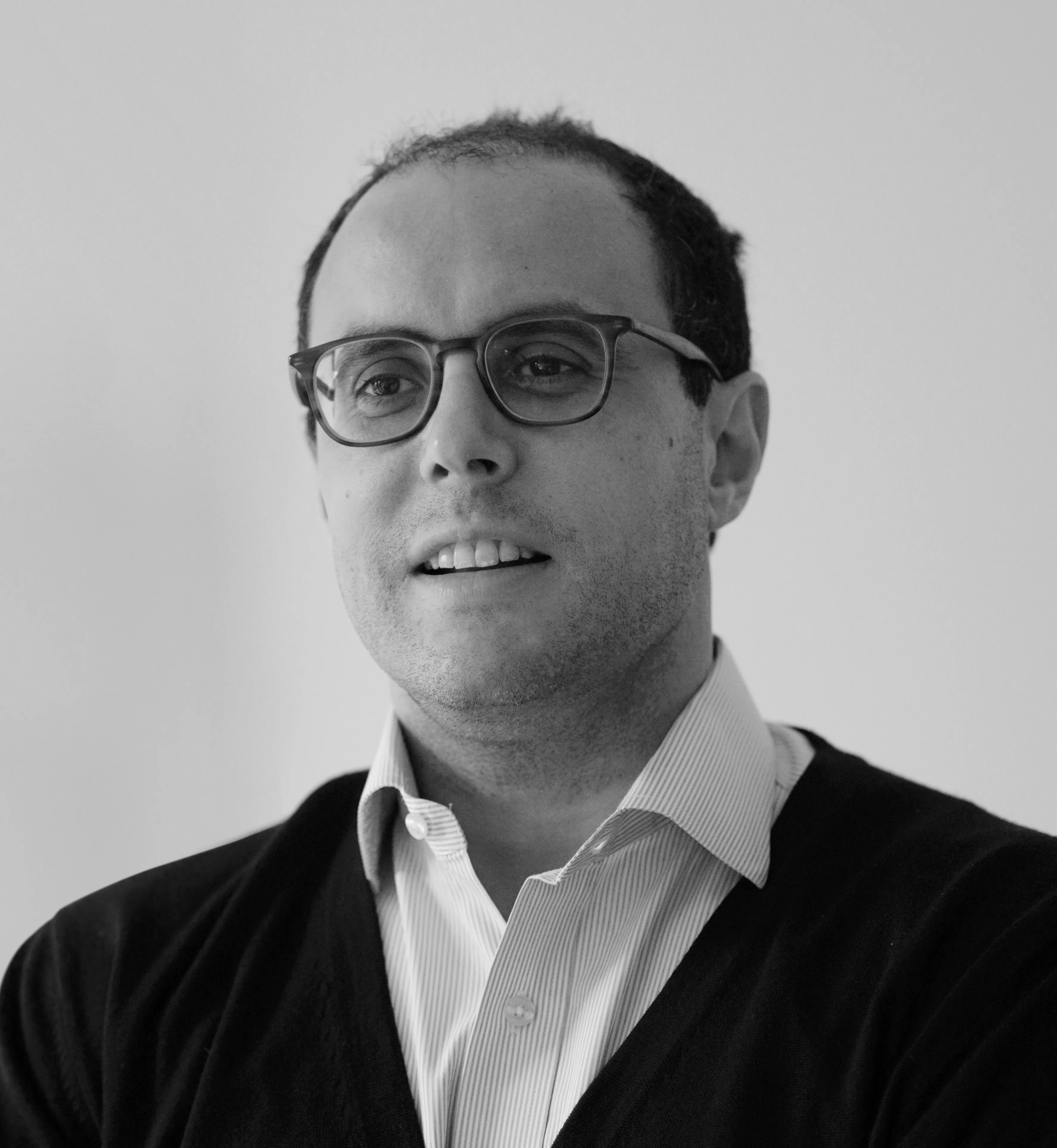
 Sign in with Google
Sign in with Google 